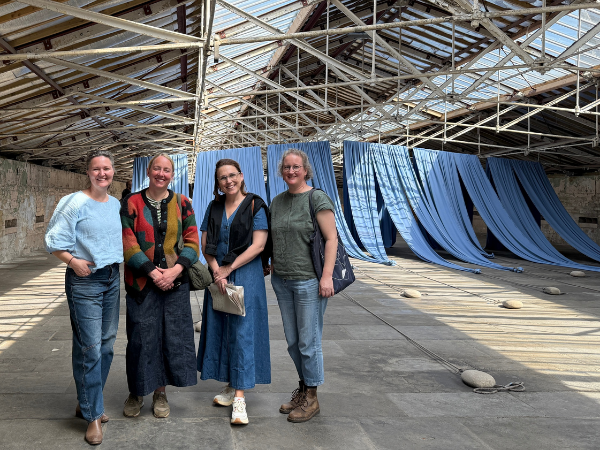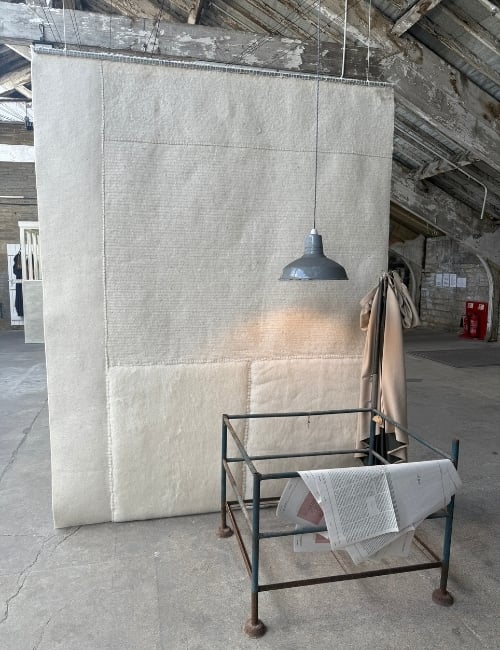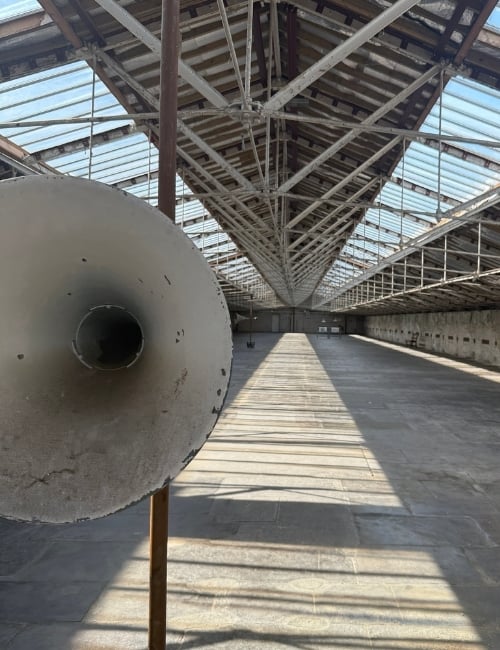Use for a call out
Possible option to have. Can have 2 or 3 columns - stacks on mobile
5 min read
Naomi Clark : Nov 18, 2025 2:41:29 PM
.jpg?width=1920&height=1080&name=Nicola%20Bennett%20All%20Email%20designs%20(53).jpg)
On our recent trip to the UK, Jo Wright and I were fortunate to spend time with artists Alice Fox and Claire Wellesley-Smith. To our delight, Ann Hamilton’s exhibition We Will Sing at Salts Mill was showing at the time, and together we explored Ann’s extraordinary exhibition, which offers a rare chance to step into the vast top floor of Salts Mill, usually closed to the public.
Claire had actually been part of the exhibition installation process, and it was a privilege to hear her describe not only the beauty of the work but also the practical challenges of bringing such a large-scale and sensitive project to life in a historic space.
.jpg?width=700&height=394&name=WOODS%20LANDING%20PAGE%20IMAGES%20(1).jpg)
Claire had actually been part of the exhibition installation process, and it was a privilege to hear her describe not only the beauty of the work but also the practical challenges of bringing such a large-scale and sensitive project to life in a historic space.
While our photos don’t do the exhibition justice, I hope my recollection and insights below help paint a picture for you…

Ang, Claire Wellesley-Smith, Jo and Alice Fox at the Anne Hamilton Exhibition
The exhibition occupies the rarely opened top floor of Salts Mill. Even the act of climbing the wide staircase was moving; I couldn’t help but think of the countless workers who must have trudged those same steps when the mill was alive with industry. At the top, the scent of lanolin from the wool enveloped us, an immediate reminder of Bradford’s rich textile past.
Walking into the first hall was breathtaking. Once a spinning and weaving room for worsted textiles, it is now an immense, almost cathedral-like space. The scale is humbling, filled with light, pattern, repetition, and texture. The beauty of We Will Sing is that Anne Hamilton doesn’t attempt to crowd the room with objects; instead, she fills it in every sense of the word. Her vision was to let sound inhabit the architecture itself, choosing three large revolving speakers adapted from the mill’s original horn speakers, which release layers of voice, humming and whistling. The effect feels at once ancient and intimate, like fragments of folklore, a kind of sacred language that stirs memory.
.jpg?width=400&height=400&name=Newsletter%20Square%20designs%20(6).jpg)
Walking into the first hall was breathtaking. Once a spinning and weaving room for worsted textiles, it is now an immense, almost cathedral-like space. The scale is humbling, filled with light, pattern, repetition, and texture. The beauty of We Will Sing is that Anne Hamilton doesn’t attempt to crowd the room with objects; instead, she fills it in every sense of the word. Her vision was to let sound inhabit the architecture itself, choosing three large revolving speakers adapted from the mill’s original horn speakers, which release layers of voice, humming and whistling. The effect feels at once ancient and intimate, like fragments of folklore, a kind of sacred language that stirs memory.
Walking into the first hall was breathtaking. Once a spinning and weaving room for worsted textiles, it is now an immense, almost cathedral-like space. The scale is humbling, filled with light, pattern, repetition, and texture. The beauty of We Will Sing is that Anne Hamilton doesn’t attempt to crowd the room with objects; instead, she fills it in every sense of the word. Her vision was to let sound inhabit the architecture itself, choosing three large revolving speakers adapted from the mill’s original horn speakers, which release layers of voice, humming and whistling. The effect feels at once ancient and intimate, like fragments of folklore, a kind of sacred language that stirs memory.

Possible option to have. Can have 2 or 3 columns - stacks on mobile
Currently only icons above the subheader and copy
.png?width=92&height=100&name=1%20(5).png)
But let's see if we can switch that to images (small images)
Walking into the first hall was breathtaking. Once a spinning and weaving room for worsted textiles, it is now an immense, almost cathedral-like space. The scale is humbling, filled with light, pattern, repetition, and texture. The beauty of We Will Sing is that Anne Hamilton doesn’t attempt to crowd the room with objects; instead, she fills it in every sense of the word. Her vision was to let sound inhabit the architecture itself, choosing three large revolving speakers adapted from the mill’s original horn speakers, which release layers of voice, humming and whistling. The effect feels at once ancient and intimate, like fragments of folklore, a kind of sacred language that stirs memory.
Walking into the first hall was breathtaking. Once a spinning and weaving room for worsted textiles, it is now an immense, almost cathedral-like space. The scale is humbling, filled with light, pattern, repetition, and texture. The beauty of We Will Sing is that Anne Hamilton doesn’t attempt to crowd the room with objects; instead, she fills it in every sense of the word. Her vision was to let sound inhabit the architecture itself, choosing three large revolving speakers adapted from the mill’s original horn speakers, which release layers of voice, humming and whistling. The effect feels at once ancient and intimate, like fragments of folklore, a kind of sacred language that stirs memory.

If we want best spacing all images used in there need to be all landscape or all portait. Now this has one landscape and one portait and on desktop andmobile view (but much more noticable on mobile) the landcape image has way too much space above and below it (to allow for the portait image on the next slider).

Learn tips & tricks on how to use the all-new Content Slider module here. Have feedback on an awesome feature we should add to this module or discover a bug? Pop right over here to submit your ideas.

Revolving speaker in Ann's We Will Sing exhibition.
Walking into the first hall was breathtaking. Once a spinning and weaving room for worsted textiles, it is now an immense, almost cathedral-like space. The scale is humbling, filled with light, pattern, repetition, and texture. The beauty of We Will Sing is that Anne Hamilton doesn’t attempt to crowd the room with objects; instead, she fills it in every sense of the word. Her vision was to let sound inhabit the architecture itself, choosing three large revolving speakers adapted from the mill’s original horn speakers, which release layers of voice, humming and whistling. The effect feels at once ancient and intimate, like fragments of folklore, a kind of sacred language that stirs memory.
Walking into the first hall was breathtaking. Once a spinning and weaving room for worsted textiles, it is now an immense, almost cathedral-like space. The scale is humbling, filled with light, pattern, repetition, and texture. The beauty of We Will Sing is that Anne Hamilton doesn’t attempt to crowd the room with objects; instead, she fills it in every sense of the word. Her vision was to let sound inhabit the architecture itself, choosing three large revolving speakers adapted from the mill’s original horn speakers, which release layers of voice, humming and whistling. The effect feels at once ancient and intimate, like fragments of folklore, a kind of sacred language that stirs memory.
.jpg)
.jpg)